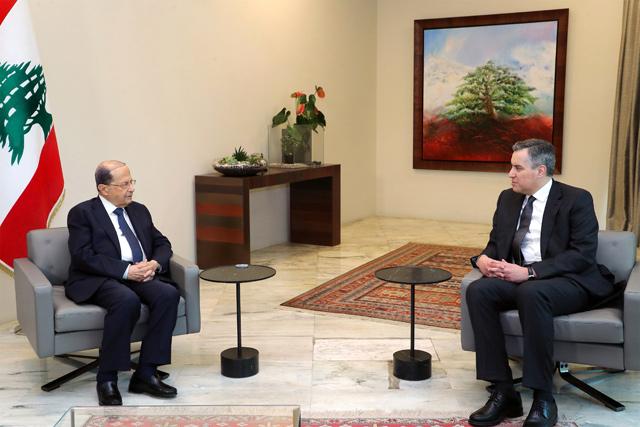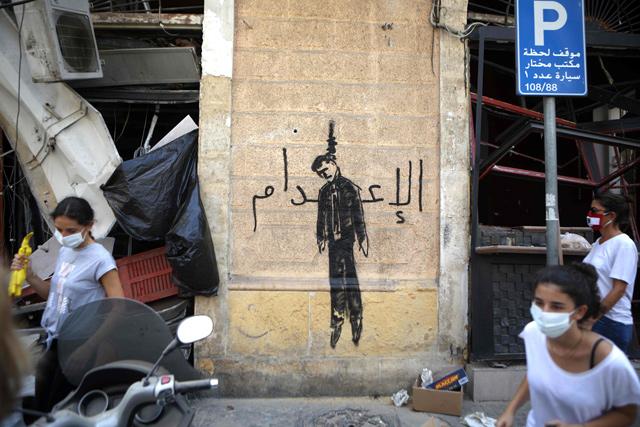You are here
Lebanon PM designate pledges to form 'expert gov't' in record time
By AFP - Sep 02,2020 - Last updated at Sep 02,2020

Lebanese security forces stand with riot shields during clashes with protesters amidst an anti-government demonstration in the centre of Lebanon's capital Beirut on Tuesday (AFP photo)
BEIRUT — Lebanon's prime minister designate Mustapha Adib pledged to form a 'government of experts' to drive desperately needed reforms in the disaster-hit and economically ailing country.
His announcement came after a high-profile visit by Emmanuel Macron during which the French president said political leaders had agreed on a reform road map involving a government being put together within two weeks, following last month's devastating blast in the port of Beirut.
"As I leave Beirut, I want to say again and with conviction: I will not abandon you," Macron said in a statement as he flew out on Wednesday.
The last government resigned in the face of public anger over the August 4 explosion that killed at least 190, wounded thousands and laid waste to entire districts of the capital.
"We hope that we will quickly succeed in forming a government made up of a coherent team that is focused on dealing with the many dossiers before us," Adib said in a televised statement after concluding initial consultations.
"We will proceed from the principle that the government should be a government of experts."
Government formation is usually a drawn-out process in multi-confessional Lebanon where a complex political system seeks to share power between different religious groups.
But the country's deadliest peacetime disaster has created intense pressure for swift reforms to lift it out of its worst economic crisis in decades.
Adib started meeting parliamentary bloc leaders on Wednesday, as Pope Francis warned Lebanon faced "extreme danger that threatens the very existence of the country".
"Lebanon cannot be abandoned to its solitude," the Pope said.
Lebanese lawmakers rushed to approve the nomination of the little-known 48-year-old diplomat on Monday just hours before the French president landed.
Under Lebanon’s power-sharing system, the country’s main religious communities usually agree on a new government lineup before its announcement.
President Michel Aoun on Wednesday said that Macron’s “drive” to help Lebanon “must be matched by an honest Lebanese determination to help ourselves and to form a capable and transparent government as soon as possible”.
The forthcoming government, the president said, should take “immediate steps towards reform”.
Gebran Bassil, the president’s son-in-law and head of the Free Patriotic Movement said that ministerial portfolios in the new Cabinet should not be reserved for specific parties as had been the case in the past.
Lebanon’s worst economic crisis since the 1975-1990 civil war has seen poverty rates double to more than half the population, sent prices soaring and trapped people’s savings in the banks.
Visiting to mark the centenary of the former French protectorate, Macron strove to push for political change without being perceived as meddling in the country’s affairs.
But Lebanese newspaper Al Akhbar complained the French president had behaved like the “supreme leader of the Lebanese republic” on his visit.
Macron promised to host two conferences in Paris in the second half of October — one to help drum up aid and the other to discuss progress on political reforms. He said he would be back in Lebanon in December.
International donors on August 9 pledged more than 250 million euros (around $300 million) in emergency aid, during a video conference jointly organised by France and the United Nations.
‘Clock is ticking’
Analyst Karim Bitar said that, considering the unusual speed with which the prime minister was nominated, Lebanon could have a new government within the next few weeks.
“Everyone in Lebanon now realises that we no longer have the luxury of time, that the clock is ticking,” he said.
“I do think that the French pressure will lead to some forms of change in the short term because Lebanon is in such a difficult financial” situation, but such changes risked being only “cosmetic reforms”, he said.
“I very much doubt that they... would accept the structural reforms, the systemic reforms that Lebanon desperately needs because that would mean their own disappearance ultimately,” he added, referring to the political establishment.
A protest movement, which has taken to the streets since last October demanding the ouster of the political elite, has already rejected Adib’s nomination on principle.
They allege he is too close to a political class whose alleged corruption and incompetence they blame for the explosion of a large shipment of ammonium nitrate that had languished at Beirut’s port for years.
US Assistant Secretary of State for Near Eastern Affairs, David Schenker, was due in Lebanon on Wednesday, the State Department said.
He would “urge Lebanese leaders to implement reforms that respond to the Lebanese people’s desire for transparency, accountability and a government free of corruption”.
Related Articles
BEIRUT — Lebanon's premier-designate stepped down on Saturday, saying he had been unable to form a reform-minded government to lift the coun
PARIS — France on Tuesday urged competing political forces in Lebanon to agree on forming a government "without delay" as it ramped up press
PARIS — French President Emmanuel Macron on Sunday upped the pressure on Lebanon's leaders to form a government in the wake of the Beirut po

















